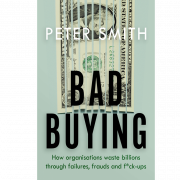Sheffield Container Park Failure – Classic Bad Buying
Sheffield Council has been dysfunctional for some time, and will always be remembered as the council that decided thousands of mature trees would be destroyed in order to make pavements safer, or something like that.
There has been considerable “churn” at both elected councillor and senior officer level in recent years too, which doesn’t help, and the council is now in an “no overall control” state in terms of political leadership. But the Sheffield Fargate container park failure is not really “political” – it appears to be simply an example of what was very bad buying and probably even worse project management.
The controversial complex which was supposed to include shops, bars and entertainment failed due to poor decision making and a lack of governance, an internal audit report has found. The container park was intended as a pop-up space for stalls and shops but was beset by delays and criticism. The £500,000 project opened in October 2022, but closed just three months later after a host of issues and lack of interest from traders and locals.
The “Head of Service” appears to be the individual who should carry most of the blame here, being responsible for the project. They “did not have dedicated specialist skills, support and resource. The Council’s specialist project management teams were not fully or formally involved, but only called upon using an ‘ad-hoc’ approach”. It is not clear why specialist project managers weren’t involved but one cause seems to have been a rush to “get it done” to take advantage of various time-limited post-covid grants.
But I have to say, procurement does not seem to have covered itself in glory either. There was no formal procurement manual in place explaining the desired process to users, for a start. Then the function carried out research on other container parks to try and identify potential suppliers who might be interested in developing the Sheffield park. A list was provided to the project owner as a potential tender list.
“However, when the suppliers on this list were approached it was found that they were management companies for the container parks, not the initial developers. No response came from those who were approached”. So not the best piece of market and supplier research I’ve ever come across…
This left just one supplier in the running, a firm that was already speaking to the Head of Service. They duly won the contract without any competitive tendering. Lack of competition is of course a fundamental driver and predictor of poor performance and bad buying. “Though procurement was signed off at the correct level, there was no evidence to demonstrate that it was robust or complete to result in an informed decision-making process”.
Then there seems to have been a lack of control in terms of payments to this supplier. There was no implementation plan so milestones were unclear, and the main contractor was not monitored in a structured or regular manner through the installation process. Some of the report is redacted so we don’t get to see everything but comments such as this don’t fill you with confidence. “…more worryingly formal financial and contractor monitoring throughout the work was poor or non-existent, furthermore, no risk management was in place”. Indeed, the auditors were unable to test whether everything procured and paid for was actually received, which is pretty shocking and a very basic failure.
Invoices appeared to have been paid without proper authorisation, and whilst there is no evidence of anything criminal here, the lack of competition and then controls does mean that the risk of fraud or corruption was not at all managed. The budget of some £300K ended up as an actual spend £500K and certainly, the Head of Service should never be allowed near a budget again.
Anyway, there were problems with the installation including safety issues and only the ground floor could be opened – and that was ten months late, opening in October 2022 rather than the Jan/February plan. And just three months later, the development was closed.
So, various points to note and learn from here. Procurement must make sure budget holders know what the rules are. Procurement also needs to make sure they understand what they are buying when they conduct market and supplier research. Competition is always a Good Thing. Project management is a skill – use professionals. Controls on payments and clear deliverables for suppliers are fundamental and must not be neglected no matter how “urgent” the work is.
Sorry to Sheffield taxpayers (including my sister…) but the only good news here is that this is yet another interesting case study for my Bad Buying module when I lecture at Skema Business School next year…









Leave a Reply
Want to join the discussion?Feel free to contribute!